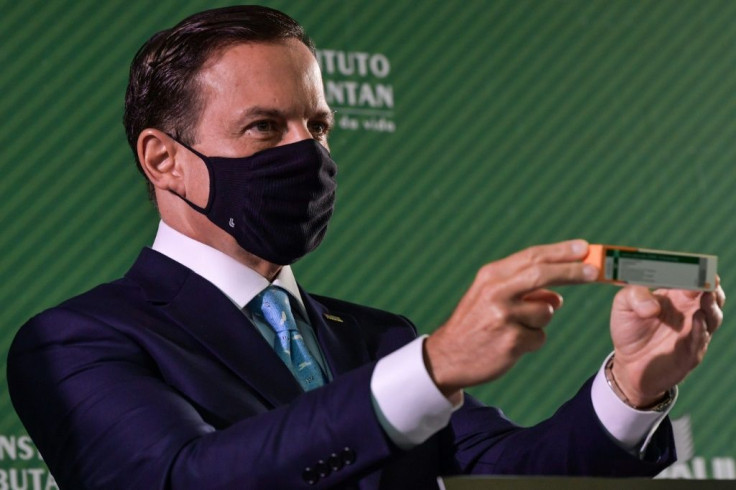Brazil Gives Nod To Emergency Use Of 2 COVID-19 Vaccines, Shots Begin
KEY POINTS
- Monica Calazans became the first person in Brazil to receive the jab
- Brazil has recorded 8.4 million COVID-19 cases to date
- Over 200,000 deaths have been linked to the virus in the country
After a slew of anti-vaccine campaigns, disinformation and political infighting that kept bungling the COVID-19 immunization plans of Brazil, the South American nation has finally started its vaccine rollout.
Brazil’s Health Regulator Anvisa on Sunday gave emergency approval to two Covid-19 vaccines — from China’s Sinovac Biotech Ltd and Britain’s AstraZeneca — as the country witnessed a second wave of the outbreak. The health regulator's board of directors voted unanimously to approve the two vaccines, both of which require two doses.
Brazil, just behind the United States and India, has recorded over 8.4 million COVID-19 cases to date, according to data collected by Johns Hopkins University. Over 200,000 deaths have been linked to the virus in the country since the pandemic began.
The nation's president Jair Bolsonaro, who has often downplayed the virus, had earlier raised suspicions over the efficacy of China's CoronaVac and even insisted that he would not get vaccinated. He contracted the virus in July last year.
Widespread vaccine skepticism mounted in the country soon after and people protested against the Governor’s support for mandatory COVID-19 vaccination in São Paulo in November.
Soon after the approval of the vaccine on Sunday, Monica Calazans, a nurse from São Paulo, received the first dose of the COVID-19 vaccine. "You don't understand what this means to me,” she told São Paulo state governor João Doria, according to CNN. Calazans is at high risk for COVID-19 complications and has been working in an ICU since April.
The vaccine approval comes amid reports that a new coronavirus variant has been discovered in Brazil. The variant shares similarities with the ones found in Britain and South Africa. A state of emergency has been declared in the country’s Amazonas region as the city of Manaus was hard hit by the new variant of the coronavirus.
Meanwhile, CoronaVac, which is developed by China’s Sinovac, will be rolled out among health workers across São Paulo over the next few days, according to The Wall Street Journal. São Paulo-based Butantan Institute conducted the late-stage trials of the vaccine and will also produce 46 million doses in Brazil. CoronaVac has an efficacy rate of 50.4 percent — just above the 50 percent benchmark set by the World Health Organization (WHO).
The government is now waiting for the shipments of the AstraZeneca vaccine to begin a national immunization program. Brazil will procure two million doses of the AstraZeneca vaccine from the Serum Institute of India (SII). Oswaldo Cruz Foundation (Fiocruz) will import the vaccine from SII and expects to receive the first shipment by the end of January, CNN reported. Last week, the Brazilian government announced it would send a special air flight to collect the vaccine doses from India.
Brazil's Health Minister Eduardo Pazuello said the priority in the federal government’s vaccination drive will be given to health professionals. The government’s plan noted that as doses become available, immunization will be offered to the indigenous population, those over 60 years of age and the ones with pre-existing conditions.

© Copyright IBTimes 2024. All rights reserved.





















